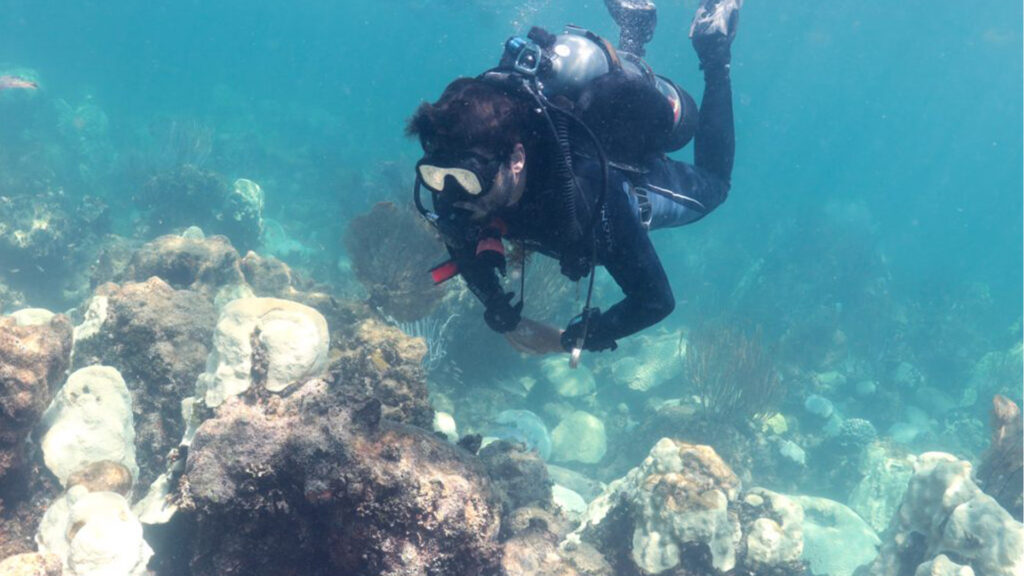By Diana Udel, University of Miami
The University of Miami Rosenstiel School of Marine, Atmospheric, and Earth Science has been awarded a nearly $1.8 million grant from the National Oceanic and Atmospheric Administration (NOAA) as part of an anticipated four-year, $4.2 million project to support research on the impacts to South Florida’s coastal ecosystems from a multitude of climate change stressors.
The newly funded project, co-led by the University of Miami Rosenstiel School and NOAA’s Atlantic Oceanographic and Meteorological Laboratory (AOML), will focus on climate impacts to South Florida’s coastal and marine ecosystems, including the Florida Keys National Marine Sanctuary and the southwest Florida shelf. The collaborative project entitled the Florida Regional Ecosystems Stressors Collaborative Assessment (FRESCA) includes seven different academic and research institutions.

“This research is vitally important because marine ecosystems are facing many different stressors,” said Ana Palacio, co-principal investigator and assistant scientist at the Rosenstiel School’s NOAA Cooperative Institute for Marine and Atmospheric Studies (CIMAS). “Previous and current research tends to focus on one individual impact to a species and ecosystem. Studying how multiple stressors impact corals reefs is critical to better understand how combined climate change stressors such as increasing ocean temperature, reduced pH and reduced oxygen levels will affect Florida’s marine life.”
South Florida’s coastal and marine ecosystems provide critical services to the United States, supporting recreation and tourism, and generating billions of dollars for the economy and tens of thousands of jobs annually. The well-being of over 6 million people in Florida’s coastal counties depend on these ecosystems.
Unfortunately, these ecosystems are impacted by a multitude of stressors, including ocean acidification, hypoxia, harmful algal blooms (HABs), increasing water temperatures and pollutants. Understanding the impacts and relationships among these multiple stressors is difficult to define, yet critical to understanding stressors’ interactions and predicting future impacts to ecosystems in South Florida.
The research team plans to conduct multi stressor experiments on sixteen key reef species, such as corals, seagrass, sargassum as well as sponges that inhabit the Florida reef system. These species are key to determining the overall reef health. The experiments will take place in the Experimental Reef Lab, a CIMAS lab which is operated in collaboration with NOAA AOML at the Rosenstiel School.
The goal of this project is to assess how five key stressors are impacting South Florida’s coastal and marine ecosystems, and to characterize the impacts of these stressors under present and future climate change scenarios, as well as Everglades, seagrass and coral reef restoration scenarios, including Mission: Iconic Reefs. Resource managers will use these products to prepare for the anticipated impacts of climate change by increasing their understanding as to how multiple stressors are likely to interact and affect these ecosystems and the communities dependent on them.
This award is supported by Fiscal Year 2023 funding from NOAA’s National Centers for Coastal Ocean Science (NCCOS), Ocean Acidification Program (OAP), the Climate Program Office (CPO), and the U.S. Integrated Ocean Observing System (IOOS) Office, in partnership with the Office of National Marine Sanctuaries (ONMS).
This piece was adapted from a NOAA news story. It was originally published at https://news.miami.edu/rosenstiel/stories/2023/11/university-of-miami-receives-1.8m-noaa-grant-to-study-south-floridas-coastal-ecosystems.html.
Sign up for The Invading Sea newsletter by visiting here. If you are interested in submitting an opinion piece to The Invading Sea, email Editor Nathan Crabbe at ncrabbe@fau.edu.



